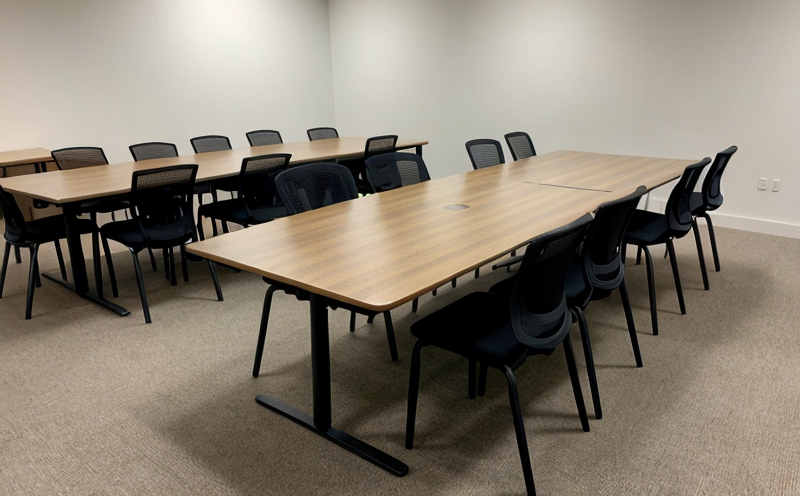ASTM D905 Strength Testing for Adhesive Bonds in Wooden Desks
The ASTM D905 standard is widely recognized as a critical tool for ensuring the quality and durability of adhesive bonds used in wooden furniture, particularly desks. This test assesses the shear strength of adhesives used in the assembly process. In the context of wooden desks, this service ensures that the joints are strong enough to withstand daily use without compromising on the structural integrity or aesthetic appeal.
The importance of this testing cannot be overstated, especially for furniture manufacturers who aim to meet stringent industry standards and customer expectations. ASTM D905 is particularly relevant in sectors where long-term durability is essential, such as office environments, schools, and public spaces. The test helps prevent the potential risks associated with weak adhesive bonds, which could lead to premature failure or structural instability.
During this testing process, specimens are prepared according to specific standards laid out by ASTM D905. These include selecting appropriate wood types, cutting precise dimensions for the samples, and ensuring that the adhesives used meet the specified requirements. The test setup typically involves gluing two pieces of wood together under controlled conditions and then subjecting them to shear forces until failure occurs.
The results from ASTM D905 testing provide valuable insights into the performance characteristics of various adhesives, allowing manufacturers to make informed decisions about which products best suit their needs. By adhering to this standard, companies can enhance product reliability while also complying with relevant regulations and industry best practices.
For quality managers looking to ensure consistent product quality, ASTM D905 testing offers a reliable method for validating the effectiveness of different adhesives across various types of wood commonly used in desk manufacturing. Compliance officers will appreciate how this service supports their efforts towards maintaining high standards throughout production processes. R&D engineers can leverage these tests to explore new adhesive formulations or improve existing ones by identifying areas where improvements are needed.
Given the increasing focus on sustainability within industries like furniture manufacturing, ASTM D905 testing plays an increasingly important role in promoting eco-friendly practices. By selecting adhesives that perform well under shear stress without compromising environmental considerations, manufacturers contribute positively to both product quality and sustainability goals.
Why It Matters
- Ensures long-lasting durability of wooden desks used in various settings including offices, schools, and public spaces.
- Helps prevent the risks associated with weak adhesive bonds that could lead to premature failure or structural instability.
- Supports compliance with industry standards and regulations, enhancing overall product reliability.
- Enables manufacturers to make informed decisions about which adhesives best suit their needs based on rigorous testing protocols.
The importance of ASTM D905 strength testing for adhesive bonds in wooden desks cannot be overstated. It serves as a crucial quality control measure that guarantees the integrity and longevity of furniture pieces, thereby enhancing customer satisfaction and brand reputation. This service not only meets but exceeds expectations set by regulatory bodies and industry leaders.
Scope and Methodology
| Aspect | Description |
|---|---|
| Sample Preparation | Wooden samples are cut to specified dimensions, ensuring precision in order to accurately reflect real-world conditions. |
| Adhesive Application | The adhesives used must comply with the requirements outlined by ASTM D905, guaranteeing consistent performance across tests. |
| Test Setup | Specimens are glued together and placed in a testing machine that applies controlled shear forces until failure occurs. |
The scope of the ASTM D905 strength test includes detailed procedures for preparing samples, applying adhesives, setting up tests, and interpreting results. These steps ensure accuracy and consistency, providing reliable data on adhesive performance under stress conditions.
Benefits
- Enhanced Product Quality: Ensures that only the highest quality materials are used in furniture manufacturing, leading to superior products.
- Increased Customer Satisfaction: By reducing defects and failures due to weak adhesive bonds, customers receive more durable and reliable desks.
- Compliance with Industry Standards: Helps manufacturers stay ahead of regulatory requirements by ensuring adherence to recognized standards like ASTM D905.
- Eco-Friendly Practices: Identifies adhesives that offer strong performance while minimizing environmental impact, supporting sustainable manufacturing practices.
The benefits extend beyond just technical aspects; they also encompass broader business goals such as improving customer loyalty and reducing operational costs associated with recalls or replacements. With this service, furniture manufacturers can build trust with their clients while maintaining a competitive edge in the marketplace.





